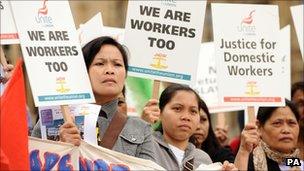
California Governor Brown’s recent veto of the Domestic Workers‘ Bill of Rights (AB889) has given several domestic workers‘ groups a platform on which to raise awareness about and discuss the significance of equal rights for and, even more, valuation of domestic workers. Unfortunately, this is the only positive outlook on Brown’s veto.
According to a member of the California Domestic Workers Coalition, “more than just protecting meal breaks, the workers had hoped the bill would signal a fundamental shift in the way society regards their work.” Domestic workers, most of whom also need to provide and take care of their own families, deserve to both feel and actually be legitimate in regards to their job security and self-representation while on the job.
By referring to domestic workers as “companions” to the elderly and disabled, it evokes a responsibility of love and devotion to their employers – one that is too easily manipulated and exploited by the state (in this case, Gov. Brown specifically) who believes it would be dangerous for the elderly and disabled to regulate domestic work.
However, this seems like it would be a very workable issue once domestic workers are recognized under the basic protection of job rights. In fact, the Director of the National Domestic Workers Alliance, Ai-jen Poo, says that “it was clear [they] would work through [the state’s questions] during the regulatory process [after the bill was signed].” One foreseeable solution could be the implementation and regulation of shifts by domestic worker unions. This would hopefully allow the workers to receive eight hours of daily and fairly paid work.
Without saying it, it appears that another concern of Governor Brown’s is the immigration status of these California domestic workers. As a US citizen myself, I am less concerned with this aspect of the issue. Since these domestic workers are worthy enough to take care of other people’s children, grandparents, houses, etc., this should earn them the right to visibility in regards to both the law and society.
Zoë Waltz
(Photo Credit: California Domestic Workers Coalition)





